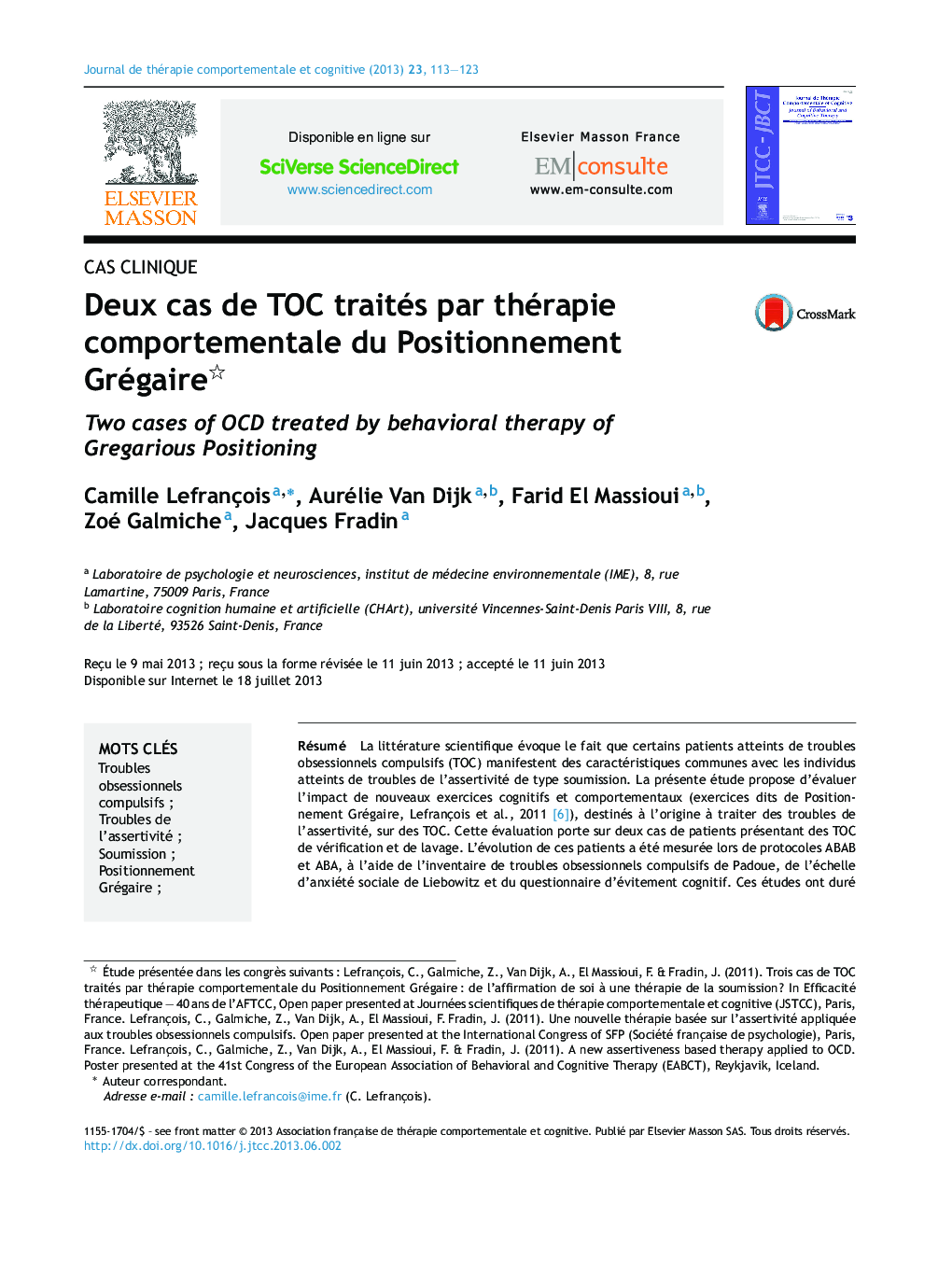| کد مقاله | کد نشریه | سال انتشار | مقاله انگلیسی | نسخه تمام متن |
|---|---|---|---|---|
| 934634 | 923677 | 2013 | 11 صفحه PDF | دانلود رایگان |
عنوان انگلیسی مقاله ISI
Deux cas de TOC traités par thérapie comportementale du Positionnement Grégaire
دانلود مقاله + سفارش ترجمه
دانلود مقاله ISI انگلیسی
رایگان برای ایرانیان
کلمات کلیدی
موضوعات مرتبط
علوم پزشکی و سلامت
پزشکی و دندانپزشکی
روانپزشکی و بهداشت روانی
پیش نمایش صفحه اول مقاله

چکیده انگلیسی
Scientific literature has shown that some patients with obsessive-compulsive disorders (OCD) have certain characteristics in common with individuals suffering from assertiveness disorders involving submission. The present study investigates the impact of new cognitive and behavioral exercises (Gregarious Positioning [GP] Exercises, Lefrançois et al., 2011 [6]) on two OCD patients, Mr A. and Mrs O. These exercises (GP exercises) were originally intended to treat assertiveness disorders. They act as an “antidote” to submissive disorders, and consist of five consecutive role-plays lasting five minutes. The patients' progress was measured using an ABAB and an ABA protocol, with the help of the Padua Inventory for OCD, the Liebowitz Social Anxiety Scale and the Cognitive Avoidance Questionnaire. Mr A.'s OCD began 7 years prior the study and involved fear of causing an accident. At the start of the study, he experienced obsessions for 4 or 5 hours a day and compulsions for 3 hours per day. For example, he waited for one hour on a pavement before crossing the road, and then repeated this behavior after crossing to ensure that he had not caused an accident. Mr A.'s social anxiety score was moderate/marked at the beginning of the study. After two weeks of treatment, his score corresponded to an absence of social anxiety, and he was able to cross the road alone without any compulsions. His OCD disappeared 2.5 months into the study. The different results lead us to assume that Mr A. stopped these exercises prematurely after a first reduction in his symptoms. However, assessments carried out 3 years later showed that Mr A.'s obsessions remained much less intense than prior to the study, and the compulsions were no longer evident. Mrs O. had suffered from OCD for 36 years. She had taken part in several types of therapy (group sessions, conventional behavioral therapy and psychoanalysis) and received medication, without success. She had been hospitalized several times and experienced depressive episodes. Due to these problems, at the age of 46, she had been forced to stop work for two and a half years. Prior to the study, Mrs O.'s obsessions could last all day and involved the fear of contaminating others by not washing properly. Her compulsions consisted of repetitive washing rituals of the hands and body, and lasted for six hours a day. Mrs O. was asked to perform the GP exercises before, during and after her daily rituals. After 15 days of treatment, her obsessions only appeared before her shower, and her washing time only lasted for 20 minutes. Unfortunately, certain life events (the death of her mother, her daughter leaving home) made the continuation of treatment difficult. In addition, the patient feared that if her condition improved, she would no longer receive attention. She reacted very strongly against the idea of doing anything, which could improve her condition and make her more independent. At the same time, she continued to ask for help but refused any therapeutic act, which required commitment on her part. Her OCD has reappeared but, as far as we know, has not reached the same level as prior to the study. These encouraging results have to be added to those of another OCD patient, who performed the exercises for one year, and had no signs of OCD following the therapy (Lefrançois et al., 2011 [18]). The efficacy of the GP exercises should now be confirmed using a larger group of OCD patients. The present article also discusses the role of submissive behavior in the onset of OCD.
ناشر
Database: Elsevier - ScienceDirect (ساینس دایرکت)
Journal: Journal de Thérapie Comportementale et Cognitive - Volume 23, Issue 3, September 2013, Pages 113-123
Journal: Journal de Thérapie Comportementale et Cognitive - Volume 23, Issue 3, September 2013, Pages 113-123
نویسندگان
Camille Lefrançois, Aurélie Van Dijk, Farid El Massioui, Zoé Galmiche, Jacques Fradin,